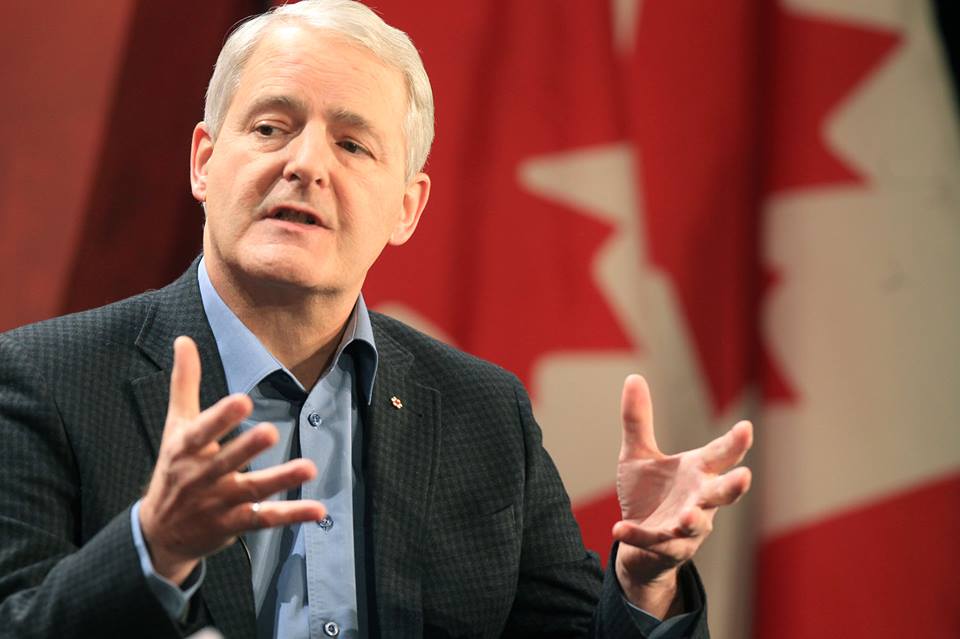Canada News
Transport minister orders trains to use handbrakes after deadly derailment

Marc Garneau said in a statement late Friday that the order is a precaution until the cause of the derailment is determined. It takes effect immediately. (File Photo: Marc Garneau/Facebook)
CALGARY — Canada’s transport minister has ordered the use of handbrakes on all trains stopped on mountain slopes following a deadly derailment earlier this week in the Rocky Mountains.
Marc Garneau said in a statement late Friday that the order is a precaution until the cause of the derailment is determined. It takes effect immediately.
“My department has issued a Ministerial Order under the Railway Safety Act to all railway companies mandating the use of handbrakes should a train be stopped on a mountain grade after an emergency use of the air brakes. This order takes effect immediately and will remain in effect as long as necessary,” said Garneau.
“As I have said many times before, rail safety is my top priority and I will never hesitate to take appropriate actions when necessary.”
A Vancouver-bound train with 112 grain cars was parked for two hours with its air brakes engaged on a grade east of Field, B.C., when it started moving on its own early Monday. The train sped up to well over the limit before 99 cars and two locomotives hurtled off the tracks.
Three employees with Canadian Pacific Railway — engineer Andrew Dockrell, conductor Dylan Paradis and trainee Daniel Waldenberger-Bulmer — were killed.
In a statement late Friday, Canadian Pacific said it continues to mourn its railroaders while co-operating with the Transportation Safety Board in its ongoing investigation.
The company said it has reopened the mainline through Field, B.C., and has taken steps to further enhance safety by adding to its existing protocols for trains on mountain grades across its network.
“CP will also fully comply with (Transport Canada’s) order relating to train securement,” said the statement.
A spokesman with Canadian National Railway, which also travels through the mountains, said that company also endorses the measure by Transport Canada.
The Transportation Safety Board has said handbrakes were not applied in Monday’s derailment.
A report by Canadian Pacific Railway detailed how challenging it is to run trains in frigid temperatures. It was about -20 C at the time of the crash.
“Harsh winter conditions are an inescapable reality in Canada’s northern climate,” says a document titled White Paper: Railroading in the Canadian Winter on Canadian Pacific Railway’s website.
“Winter has a profound impact on a railway’s operations and its ability to maintain service for its customers.”
The white paper said cold increases air leakage from a train’s air- brake system that results in varying air pressures between the head and tail end of a train.
“This is a major challenge.”
Trains are shortened when temperatures dip below -25 C to ensure pressure remains consistent throughout their entire length, the report said.
A union representative has said the derailed train was shorter than the 135 cars CP has run in recent years. But a veteran Boston-based engineer said 112 cars is large for a train of full grain hoppers.
“Our forefathers in the business would never have put a train together that big under those climatic conditions and expected it to run smoothly,” said Joe Mulligan with Railroad Workers United, a volunteer-run group of rank-and-file railroaders across North America.
Mulligan said it would have taken a lot of handbrakes to hold back a train so big. And there was nothing to be done once the train was in motion.
The Calgary-based railway said in the report that it also places locomotives at different points along a train in the winter. Distributing power that way makes it quicker to pressurize air brakes. The train that derailed had a locomotive at the front, middle and end.
In extreme cold, dryers are used to prevent moisture from getting into the brakes, which means it takes longer to pressurize them and do the required safety checks, said the winter railroading report.
“This unavoidably increases the train’s terminal dwell time.”
The white paper also said train speeds must be reduced in frigid temperatures — by at least 16 km/h below -25 C and by at least 32 km/h at -35 C.
Will Young, a locomotive mechanic based in Kansas City, Mo., and an organizer at Railroad Workers United, said cold weather takes a toll on many train components.
“Things break that normally don’t. Steel just becomes brittle. Rubber seals just harden and don’t work.”
Young said he suspects some sort of mechanical issue caused the braking system to lose power. That could have set off the chain of events that led to the catastrophe.
“It only takes that ever-so-slight touch of momentum.”





















